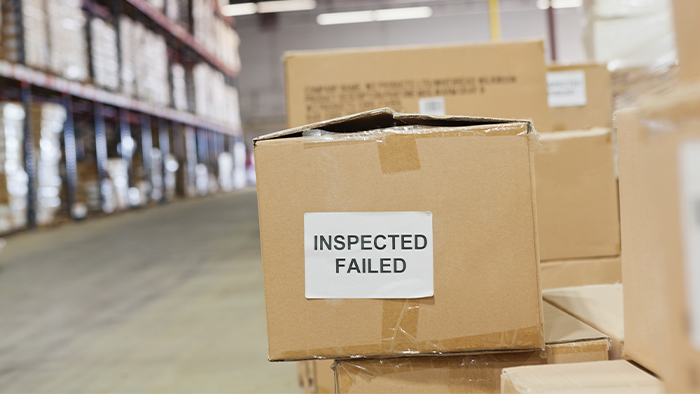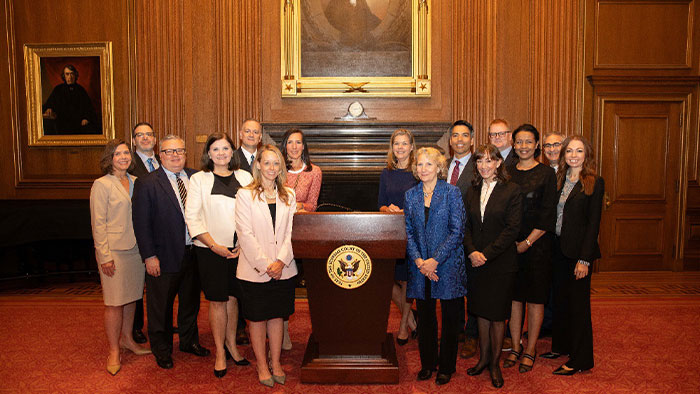Retail Leaders Discuss Product Safety, Sustainability
Consumer Products Committee Virtual Fall Meeting Recap
- By [ Erin Hiatt , Susan Kirsch ]
- 12/04/2020
Part 1 – Consumer Products Committee Meeting (September 10, 2020)
Part 1 of the two part meeting kicked off with a Presentation and Dialogue with Consumer Products Safety Commission (CPSC) Commissioner Peter Feldman, who gave members some insight into recent CPSC regulatory actions, as well as his forecast on what 2021 would look like based upon the election outcome.
Next, Committee Members heard a presentation from Cheri Falvey, Partner with CPC Strategic Partner Crowell & Moring. In her presentation entitled - Who is the Regulator? What is the Rule? - Navigating the Regulatory Alphabet Soup, Falvey discussed the Food & Drug Administration (FDA), Federal Trade Commission (FTC), and Environmental Protection Agency (EPA), and how they each categorize different COVID-related products. She discussed regulatory classifications and requirements differ for masks, gloves and hand sanitizers based on their descriptions, how they are advertised and whether any pre-approval or certification was necessary before distribution. Key takeaways from her presentation:
- Advertising claims can change the regulatory profile of a product in a way that would then require FDA approval where it previously did not; and
- When labeling products, words such as “sanitizer” and “disinfectant” have very specific meanings under EPA’s regulations and can only be used with EPA approval.
Members then engaged in two lively rounds of breakout sessions where discussions focused on product safety programs; recalls/CPSC interactions and chemical safety issues.

To round out the day, the virtual meeting wrapped up with a partner case study entitled Using Market Data to Mitigate Product Risk and Strengthen Compliance Programs from Kaitlyn Poole, Project Manager, Store Brands Quality Assurance Team, at RILA member CVS Health & Val Liberman, Director of Platform Products, of CPC Strategic Partner UL. Poole and Liberman discussed a typical product life cycle and the market needs associated with it. They mainly focused on the market performance aspect of the life cycle, which includes portfolio management, supplier scorecards, recalls and complaints and returns. Some key takeaways from their presentation:
- Market data can be leveraged to inform actions throughout the entirety of the products lifecycle;
- Monitoring, collection, and analysis of product’s market performance information should be a priority for retailers and their supply chain partners; and
- Insights derived from the market performance information can help “close the loop” by improving product design, testing and inspection protocols.
Part 2 – Consumer Products and Sustainability Committee Meeting (October 13, 2020)
RILA held Part 2 of the two-part meeting jointly with RILA’s Sustainability Committee. Part 2 kicked off with a presentation entitled Product Material Decisions Part 2: Making Defensible Green Claims, given by Catherine Sheehy, Global Lead of Sustainability Partnerships with CPC Strategic Partner UL. She discussed drivers for green claims, green marketing claims and ecolabels, as well as practical steps retailers can take to substantiate green claims. Key takeaways from her presentation:
- Greenwashing creates skepticism not just for the company that may have deliberately or inadvertently greenwashed, it casts a pall on all companies in that industry and can provoke regulatory action; and
- Ecolabels, or voluntary marks on packaging are awarded upon certification against standards and can help by providing a shorthand of sorts for purchasers, for complex information.
Next, members heard from Warren Lehrenbaum, Partner at CPC Strategic Partner Crowell & Moring, who gave a presentation on the Latest on PFAS Federal and State Regulatory Developments & Implications. In his presentation, he discussed per- and polyfluoroalkyl substances (PFAS) regulatory updates at both the federal and state level. In addition, Lehrenbaum delved into how the EPA TSCA Fees Rule works for risk evaluations. Key takeaways from Lehrenbaum’s presentation include:
- Imports of any products coated with a long chain side-chain carboxylate polymer after Sep. 25, 2020 are prohibited without prior EPA review and approval (a de facto ban);
- Manufacturers voluntarily agreed to discontinue sales of certain (not-all) short-chain PFAS chemicals for use in fiber-based food packaging; and
- If your company imports a product that is intended to release a high priority substance (HPS) and you have not self-identified, you should act as soon as possible to do so.
Rounding out the day, as the final session of the two-part meeting, members engaged in a round of breakout sessions, where discussions focused on: how product safety teams support sustainability; responsible sourcing commitments; trends in managing emerging chemicals of concern in products and packaging; and follow up discussions on the market-facing green claims and PFAS presentations heard earlier in the day.
For more information on RILA’s Consumer Products Committee or Sustainability Committee, please contact Susan Kirsch, Director, Regulatory Affairs & Compliance, RILA at Susan.Kirsch@rila.org and Erin Hiatt, Senior Director, Sustainability & Innovations, RILA at Erin.Hiatt@rila.org, respectively.
Tags
-
Consumer Product Compliance
-
Product Safety
-
Retail Sustainability
-
Sustainability & Environment
-
Legal Affairs & Compliance
-
Ensuring a Safe, Sustainable Future
-
Retail Works for All of Us


